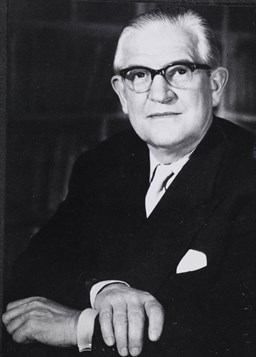Sir Archibald Hector McIndoe
MB ChB NZ, FRCS, FACS, CBE, Kt.
Born 4th May 1900, Dunedin, New Zealand
Died 12th April 1960. London.
Early Life
Archibald McIndoe, a citizen of New Zealand, came to London from the US with his family in 1931. A trained General Surgeon, he arrived for a promised job that failed to materialise. In desperation, he contacted his distant cousin Harold Gillies, who eventually offered him a job as his surgical assistant. It was in this role that McIndoe realised that Plastic Surgery was his calling.
Read more about McIndoe's early professional and personal life.
Contributions to Plastic Surgery
President of BAPS 1949. (Third President)
Knighted 1947
CBE 1944
Principle Consultant Plastic Surgeon to the RAF during the second world war
Vice President Royal College of Surgeons of England 1956-60
Recognised that those recovering from life changing, visible injuries needed long-term surgical, psychological and social support in helping them reintegrate back into civilian work and life.
Recognised the detrimental effects of Tannic acid in burns management.
Developed a procedure for congenital absence of the vagina in 1938, known as the “McIndoe” vaginoplasty, and a procedure to manage adult hypospadias – a congenital anomaly of the penis.
Developed McIndoe scissors, with curved blades allowing greater control and accuracy in soft tissue dissection .
Co-Founder Blond McIndoe Research Unit opened in his name at the Queen Victoria Hospital, East Grinstead on 22 March 1961.
World War 2
McIndoe succeeded Gillies as civilian plastic surgery consultant to the RAF just before the outbreak of World War 2 in 1939. At this time, he was one of only four experienced plastic surgeons in the UK. McIndoe’s work with terribly burnt airmen during the war, initially Battle of Britain pilots from Fighter Command, later largely from Bomber Command and the ground crews, earnt him worldwide acclaim. He developed new surgical techniques for these injuries. He banned the use of Tannic Acid from first aid use in burns, realising its potential to make burn injuries worse and less easy to reconstruct. He also popularised the use of the “Saline bath” in the management of burns.
The War cemented McIndoe’s reputation as a manually skilled, innovative, compassionate surgeon, dedicated to restoring badly injured and disabled airmen and returning them to being functional members of society. His combination of determination, forthright personality, and innovative spirit propelled him to the forefront of his rapidly developing surgical specialty. He is recognised for his unwavering dedication to restoring those badly injured and disabled airmen, supporting them in their return to civilian life.
McIndoe’s stoic and often rebellious patients called themselves the “Guinea Pig Club”, recognising that they were all recipients of his pioneering techniques. McIndoe understood early on that healing extremely injured servicemen involved physical, psychological and social therapy. His patients often endured multiple visits to the operating theatre over many months and permanent disfigurement. They required life-long support to deal with their trauma, and McIndoe continued to provide this long after their discharge from hospital. He campaigned tirelessly for his servicemen’s pension and post-conflict employment rights.
Post War
 Following the war, McIndoe continued to work at East Grinstead, splitting his time between there and a private practice in London’s Harley Street. He was awarded the CBE in 1944, then Knighted in 1947, for his services to surgery. As its Vice President, he went on to raise significant funds for the rebuilding of the Royal College of Surgeons of England, which had suffered a direct hit during an air raid. In the process, McIndoe is credited with broadening public understanding of surgeons as scientists, rather than ‘barber-butchers’.
Following the war, McIndoe continued to work at East Grinstead, splitting his time between there and a private practice in London’s Harley Street. He was awarded the CBE in 1944, then Knighted in 1947, for his services to surgery. As its Vice President, he went on to raise significant funds for the rebuilding of the Royal College of Surgeons of England, which had suffered a direct hit during an air raid. In the process, McIndoe is credited with broadening public understanding of surgeons as scientists, rather than ‘barber-butchers’.
Archibald McIndoe died in this sleep, aged 59, probably in the early hours of 12th April 1960. The previous evening he had been to the annual dinner of the Royal College of Surgeons' Council.
McIndoe was BAPS’ 3rd president, his work continuing to be honoured by BAPRAS through the McIndoe Lecture, awarded to any plastic surgeon who has made a significant contribution to the speciality. His most enduring legacy is the Blond McIndoe Research Foundation, funding cutting edge research into human skin and tissue, burn injuries and wound healing.
Read More about McIndoe and his career
For additional information:
RCS England “Plarrs Lives” entry- https://livesonline.rcseng.ac.uk/client/en_GB/lives/search/results?qu=mcindoe&te=ASSET